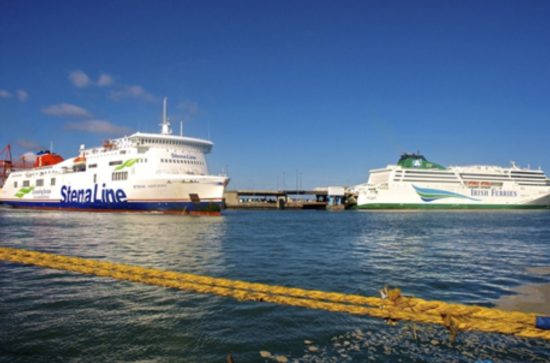
A Green Corridor initiative, aiming to establish a zero-emission shipping route between Dublin and Holyhead, has moved one step closer following a funding boost from the International Green Corridor Fund. Reducing emissions along green corridors helps accelerate global maritime decarbonisation.
‘Greening the Irish Sea - The Central Corridor’ is led by ferry operators, Irish Ferries and Stena Line, and supported by Ricardo environmental consultancy in partnership with key stakeholders, including Maynooth University. The initiative is designed to explore the feasibility of a green shipping corridor between Dublin Port and the Port of Holyhead.
The project has secured funding from the International Green Corridor Fund funded by the governments of Ireland and United Kingdom, delivered in partnership with Innovate UK and Ireland’s Marine Institute supported by the respective Department of Transports in UK and Ireland.
The Holyhead-Dublin trade route is the busiest roll-on/roll-off routes between the UK and Ireland. In 2022, nearly 1.5 million people travelled this route, with over 6,000 sailings accounting for more than 74% of all ferry passenger movements between the two countries. The ports of Dublin and Holyhead serve as key economic gateways, handling a significant volume of trade, with Dublin Port handling managing 83% of RoRo freight and 72% of ferry volumes into Ireland. This study aims to advance the decarbonisation of this critical trade artery.
The stakeholder group, which also includes Dublin Port Company and Holyhead Port Authority, the EDF R&D team and academic partners Maynooth University, will use the funding to assess the suitability of the Holyhead-Dublin route as a green shipping corridor. Detailed assessments of existing landside and vessel infrastructure will be conducted, accompanied by economic and environmental impact analysis.
The initial focus will be on vessels operated by Irish Ferries and Stena Line and the potential for e-methanol as an alternative fuel, although the feasibility of other alternative fuels will also be considered.
Dr Patrick Rigot-Müller, Lecturer in Operations and Supply Chain, MU School of Business, said: “This is a fantastic opportunity and we are very proud to be part of it. Green Shipping Corridors offer large-scale demonstrations of zero-carbon shipping, contributing to the maritime industry target to achieve a 5% adoption of zero-carbon fuels by 2030. As island nations, the UK and Ireland are both heavily dependent on international shipping, and given the highly dynamic regulatory context that surrounds green shipping nowadays it is imperative to be future-proof."
Andrew Sheen, Managing Director, Irish Ferries said: ‘We welcome this government funding and look forward to collaborating on this important project. Irish Ferries already has a strong focus on sustainability and has previously availed of Green Shipping Finance from the European Investment Bank to support our investment in new and existing ships to reduce emissions and improve fuel efficiency. We hope the feasibility studies for this project can be conducted quickly so that we can move forward to establish Ireland’s first ‘Green Corridor’ and advance our own and Ireland’s sustainability agenda.”
Ian Davies, Head of UK Port Authorities, Stena Line said: “We’re delighted to have been awarded this funding to explore establishing the first ‘Green Corridor’ between Wales and Ireland in collaboration with our partners. It is one of many initiatives that Stena Line is undertaking across ships and ports in the Irish Sea to support our sustainability strategy. We are already working to futureproof our fleet across Europe by investing in new hybrid ships and have plans to convert existing ships to be able to operate on alternative fuel. This project will allow us to determine the best way forward for our vessels on this key trading route between Dublin and Holyhead, and to assess the infrastructure needs at Holyhead Port to support a fossil free shipping corridor.”
Speaking about the project, Ken Rooney, Head of Engineering & Sustainability, Dublin Port Company said: “One of the major challenges for critical infrastructure providers such as Dublin Port is the emergence of multiple possible alternative fuel options, each with different requirements in relation to land use, electricity supply and other factors. This techno-economic study will compare e-methanol to other candidate fuels and will give us some essential insights as we plan ahead. This funding along with the partnership approach is very welcome and an important next step as we look at the alternative fuels’ infrastructure needed to reach net zero.”
Outputs will include assessments of the potential low-carbon energy pathways; a detailed exploration of the regulatory and policy measures that could support the green shipping corridor; and a business case containing project timescales, cost-benefit projections, and delivery plan.
The project will also review opportunities for local and national sustainable fuel production, and evaluate the modifications required at the ports to enable sufficient storage and bunkering. The research team will consult with engine manufacturers, operators, port authorities and alternative fuel suppliers to contrast the viability of converting existing vessels against new builds, whilst there will also be regular engagement with maritime regulatory bodies to ensure any proposals follow international and domestic requirements.
The 6-month study commences now in October 2024 and if established, the Green Shipping Corridor (GSC) between Holyhead and Dublin will be the first green route to operate between the UK and Ireland.
